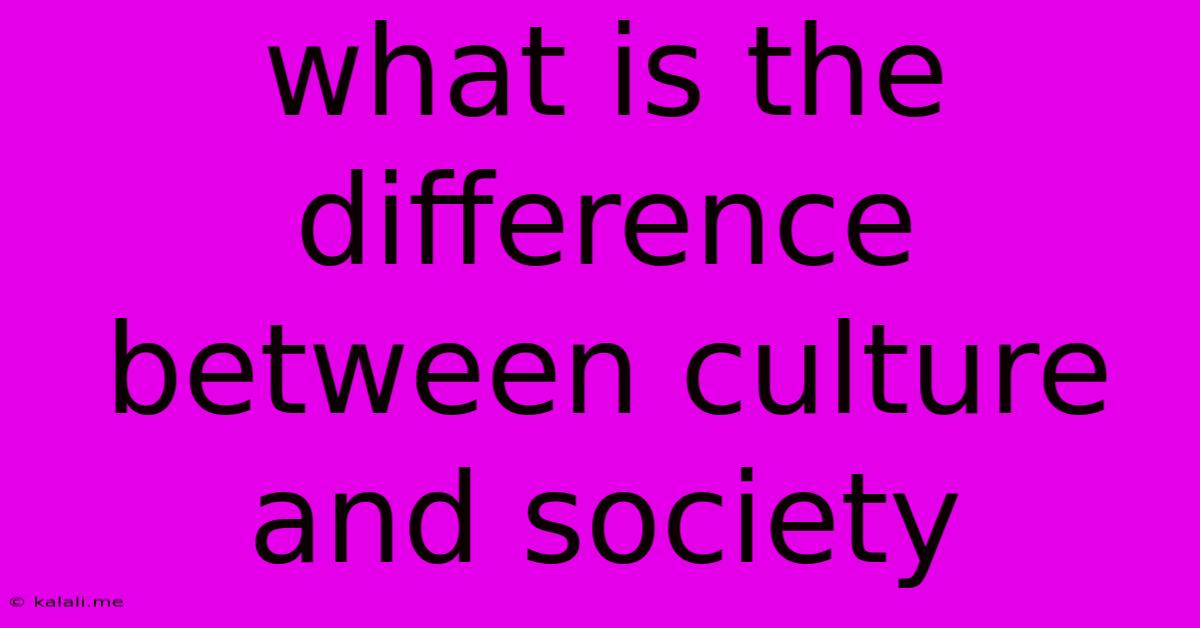What Is The Difference Between Culture And Society
Kalali
Jun 12, 2025 · 3 min read

Table of Contents
Culture vs. Society: Understanding the Key Differences
This article explores the fundamental differences between culture and society, two interconnected yet distinct concepts often used interchangeably. Understanding their nuances is crucial for anyone studying sociology, anthropology, or simply interested in human interaction and organization. We'll delve into their definitions, characteristics, and the crucial distinctions that set them apart.
While often used interchangeably, culture and society are separate but deeply intertwined concepts. Society refers to a group of individuals sharing a common geographical territory, interacting with each other, and sharing a common culture. Culture, on the other hand, encompasses the shared beliefs, values, customs, behaviours, and artifacts that characterize a society. Think of society as the structure and culture as the substance that gives it meaning and form.
Defining Society: The Structure of Human Interaction
Society, in its simplest form, is a group of people living together in a more or less ordered community. It's a structured system of relationships, governed by norms and rules (both formal and informal). Key characteristics of a society include:
- Geographic Location: Societies typically occupy a specific geographical area.
- Social Interaction: Members interact regularly, influencing each other's lives.
- Shared Norms and Values: While diverse, societies generally hold some common values and norms guiding behaviour.
- Social Institutions: Formal organizations like government, education systems, and religion, play a significant role in shaping society.
- Social Stratification: Societies often exhibit hierarchies based on factors like wealth, power, and prestige.
Defining Culture: The Shared Beliefs and Practices
Culture represents the non-material and material aspects of a society. It’s the learned and shared patterns of behavior, beliefs, and values that are transmitted from one generation to the next. Culture encompasses:
- Beliefs: Shared ideas and convictions about the world. This includes religious beliefs, scientific beliefs, and philosophical beliefs.
- Values: Principles that guide behaviour and judgments. These reflect what a society considers important.
- Customs: Traditional ways of doing things, often passed down through generations.
- Norms: Rules that govern behaviour within a society. These can be formal (laws) or informal (etiquette).
- Artifacts: Physical objects created and used by a society, reflecting its culture. This includes tools, art, clothing, and architecture.
- Language: A fundamental element, enabling communication and transmission of cultural knowledge.
Key Differences Between Culture and Society
The core difference lies in their focus: Society focuses on the structure of human relationships, while culture focuses on the shared meanings and practices that shape those relationships.
Here's a table summarizing the key differences:
| Feature | Society | Culture |
|---|---|---|
| Focus | Social structure, organization | Shared beliefs, values, and practices |
| Nature | Concrete, observable | Abstract, learned |
| Transmission | Through social interaction | Through learning and socialization |
| Scope | Geographic area, group of people | Beliefs, values, norms, customs, artifacts |
| Dynamic | Evolves through social change | Changes over time through innovation and diffusion |
The Interdependence of Culture and Society
Despite their distinct natures, culture and society are profoundly interdependent. Society provides the framework for cultural transmission, while culture shapes the behavior and interactions within society. A society without culture would lack meaning and coherence; a culture without a society would have no means of transmission or expression. They are two sides of the same coin, shaping and influencing one another constantly.
Understanding the distinction between culture and society is fundamental to appreciating the complexity of human experience and the diverse ways societies are organized and function. It provides a vital framework for analyzing social phenomena and understanding the interplay between individual actions and societal structures.
Latest Posts
Latest Posts
-
What Is The Opposite Of Traditional
Jun 13, 2025
-
What Does Xxvii Mean In Roman Numerals
Jun 13, 2025
-
What Is A Multiple Of 13
Jun 13, 2025
-
Does Cal Poly Slo Require Sat
Jun 13, 2025
-
Least Common Multiple 5 6 7
Jun 13, 2025
Related Post
Thank you for visiting our website which covers about What Is The Difference Between Culture And Society . We hope the information provided has been useful to you. Feel free to contact us if you have any questions or need further assistance. See you next time and don't miss to bookmark.